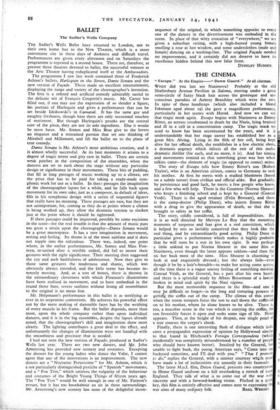THE CINEMA
Escape." At the Empire—" Dawn Guard." At all cinemas. WHEN did you last see Nazimova? Probably at the old Shaftesbury Avenue Pavilion in Salome, moving under a great semi-circle of fuzzy black hair across the grotesque and un- conscious parodies of Aubrey Beardsley which were the sets. In spite of these handicaps (which also included a blond Iokanaan aged about 19) she gave a magnificent performance, particularly in her scenes with Herod. And now we can see that tragic mask again. Escape begins with Nazimova as Emmy Ritter, an actress condemned to death by the Nazis, lying bruised and ill in a cell in a concentration camp. The tragic mask we used to know has been accentuated by the years, and it is understandable that her stage career has established her as a great Mrs. Alving. Lying in the filth of her cell, being kept alive for her official death, she establishes in a few electric shots, a dramatic urgency which infects all the rest of this melo- dramatic thriller (for such, and no more, it is). And her timing and movements remind us that something great was lost when talkies came—the element of tragic (as opposed to comic) mime.
The story of Escape tells how Emmy Ritter's son (Robert Taylor), who is an American citizen, comes to Germany to seek his mother. At first he meets with a studied blankness (based on a subtle terror) from civilian and official alike. But gradually, by persistence and good luck, he meets a few people who know, and a few who will help. There is the Countess (Norma Shearer) who keeps a finishing school and is kept by a General (Conrad Veidt). There is the aged retainer (Felix Bressart), and there is the camp-doctor (Philip Dorn), who injects Emmy Ritter with a drug to give the appearance of death, so that she is brought to safety in her coffin.
The story, coldly considered, is full of impossibilities. But it is so well directed by Mervyn Le Roy that the mounting moments of suspense and fear give it a real conviction, which is helped by sets so lavishly conceived that they look like the real thing, and by extraordinarily good acting. Philip Dorn in particular gives a performance which makes it highly probable that he will soon be a star in his own right. It was perhaps a little unkind to put Norma Shearer in the same film as Nazimova, even though the latter appears seldom—and then flat on her back most of the time. Miss Shearer is charming to look at and exquisitely dressed ; but she always fails—even though it be by a hair's-breadth—to make her acting come across. all the time there is a vague uneasy feeling of something missing. Conrad Veidt, as the General, has a part after his own heart; and there is a splendid study by Albert Basserrnan of a lawyer broken in mind and spirit by the Nazi regime.
But the most memorable sequence in the film—and one it may be difficult to forget—is the long and torturing process of gettirfg the coffin out of the camp. The climax of this comes when the storm troopers force the son to nail 'down the coffin-lid on to his mother, whom he alone knows to be alive. There is, too, a macabre scene in the van which is carrying the coffin; the son feverishly forces it open and seeks some sign of life. None appears. Then, at the height of his despair, one single pearl of a tear courses the corpse's cheek.
Finally, there is one interesting flash of dialogue which indi- cates a propagandist expression of opinion by Hollywood similar to that found in Hitchcock's Foreign Correspondent (which incidentally was completely misunderstood by a number of people who should have known better). Insulted by the General, but unable to fight back, the young American says, "Come into nlY backyard sometime, and I'll deal with you." "That I promise to do," replies the General, with a sinister courtesy which must have made a lot of isolationists stir uneasily in their fauteuils.
The latest M.o.I. film, Dawn Guard, presents two countrymen in Home Guard uniform on a hill overlooking a stretch of rural England. They talk of what Is to come out of the war with sincerity and with a forward-looking vision. Pitched in a quiet key, this film is entirely effective and comes near to expressing the






























 Previous page
Previous page